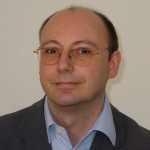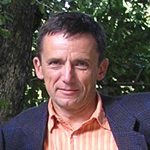Call for Papers
Important Dates
Keynote Speakers
Special Sessions
Paper Submission
Technical Program
Registration
Venue
Travel Information
Accommodation
Committees
Patrons
ELMAR History
KEYNOTE AND DISTINGUISHED SPEAKERS
|
Future Cellular Networks for a Society in Motion Prof. Markus Rupp
Vienna University of Technology |
|
Smart Home - New Way of Life or Fiction? Prof. Gregor Rozinaj
Faculty of Electrical Engineering and Information Technology |
|
Croatian National NGN Plan – State of play Ivančica Urh
Head of the Electronic Communications Division |
Future Cellular Networks for a Society in Motion
Prof. Markus Rupp
Vienna University of Technology
Austria
Abstract:
It is expected that by 2050 about 86% of the world's population shall be urbanized. Even though most people will concentrate around city centres, they will have to commute substantially. Not just going to work can require several hours a day but also every errand, every event people want to participate it. These hours of travelling can be unproductive but once wireless connections to the internet are available, lots of activities can be fulfilled. No matter if public transportation by bus or train, or individual automobile transportation, lots of wireless connections are required. But not only commuting people are causing high data traffic, also the busses, cars and trains themselves will participate in data traffic generation and finally even dominate due to many desireable features in security, safety and fleet control. The wireless internet today is based on a nomadic use for its participants. In this talk the challenges for future wireless networks to deal with such mass of high mobile users are being set and first ideas to overcome such hurdles with existing and future networks are being proposed. The limitations of the current physical layer are explained, potential solutions such as Hetnets, distributed antennas and eMBMS services are explained in such context. Only few of the recent ideas proposed for 5G networks appear as feasable solutions.
About the Keynote Speaker:
Markus Rupp (IEEE Fellow) received his Dipl.-Ing. degree in 1988 at the University of Saarbruecken, Germany and his Dr.-Ing. degree in 1993 at the Technische Universitaet Darmstadt, Germany, where he worked with Eberhardt Haensler on designing new algorithms for acoustical and electrical echo compensation. From November 1993 until July 1995, he had a postdoctoral position at the University of Santa Barbara, California with Sanjit Mitra where he worked with Ali H.Sayed on a robustness description of adaptive filters with impact on neural networks and active noise control. From October 1995 until August 2001 he was a member of Technical Staff in the Wireless Technology Research Department of Bell-Labs at Crawford Hill, NJ, where he worked on various topics related to adaptive equalization and rapid implementation for IS-136, 802.11 and UMTS, including the first MIMO prototype for UMTS as well as the first WiFi prototypes. Since October 2001 he is a full professor for Digital Signal Processing in Mobile Communications at the Vienna University of Technology where he founded the Christian-Doppler Laboratory for Design Methodology of Signal Processing Algorithms in 2002 at the Institute for Communications and RF Engineering (now Institute of Telecommunications). He served as Dean from 2005-2007 and as Head of Institute from 2014-2015. He was associate editor of IEEE Transactions on Signal Processing from 2002-2005, is currently associate editor of JASP EURASIP Journal of Advances in Signal Processing and JES EURASIP Journal on Embedded Systems. He was elected AdCom member of EURASIP from 2004-2012 and served as president of EURASIP from 2009-2010. He authored and co-authored more than 450 scientific papers and patents on adaptive filtering, wireless communications, and rapid prototyping, as well as automatic design methods.
Croatian National NGN Plan – State of play
Ivančica Urh
Head of the Electronic Communications Division
Ministry of Maritime Affairs, Transport and Infrastructure
Croatia
Abstract:
This paper informs about development of the Croatian National NGN Plan, achievements and future steps in particular on the new Broadband development strategy for Republic of Croatia in period 2016-2020, Study on funding models and support for investment in broadband infrastructure as comprehensive study of all broadband infrastructures in Croatia, National Framework Programme for access networks (ONP) for the development of broadband infrastructure in areas lacking of sufficient commercial interest for investments (white areas) and National Programme for Broadband Backhaul Infrastructure (NP-BBI). Both programmes support only infrastructure for speeds at least 30Mbps-100 Mbps with upgrade opportunities, and exclude possibility for upgrading copper infrastructure. Fibre infrastructure is priority as well as LTE. Important part of the National NGN Plan is Government Project of unification of fiber optic infrastructure of public companies with the aim of better managing surplus fiber optic infrastructure and their offerings on the market under equal conditions, to allow the achievement of strategic objectives development of broadband access for citizens and the economy.
About the Keynote Speaker:
Ivančica Urh was born in Gospić, Croatia. Ivančica was educated in Croatia and holds a M.E.E. degree from the Faculty of Electrical Engineering and Computing at University of Zagreb, Department of Radio communication.
Her career in telecommunications industry started in 1991 at Croatian Telekom and T-Mobile Croatia as a senior specialist for mobile communications and as International roaming manager. She joined the Ministry of Maritime Affairs, Transport and Infrastructure in 2005. at the beginning of negotiations for accession of the Republic of Croatia to the EU as a member of two negotiations chapters teams.
She became Head of the Electronic Communications Division in Electronic Communications and Postal Services Directorate at the Ministry in 2008.
Among the other, under the responsibility of the Division is development of strategies, NGN plans and framework programmes for broadband deployment in the Republic of Croatia on strategic level. She is a member of the National Council for Electronic Business as well.


